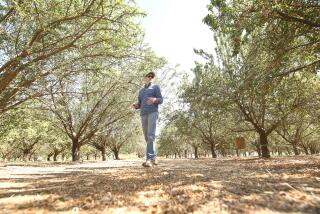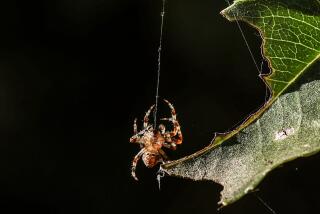Wonder Bugs : Oxnard Firm Breeds Insects to Act as Natural Form of Pest Control
- Share via
Libby Ouellette poked delicately at a cobweb covered with clumps resembling bird droppings. Nearby, hundreds of furry white larvae wiggled along a moldy-looking plant stalk.
With a cheerful grin, she scooped up a mature red and black ladybug and deposited it in a ventilated test tube.
One down, 300 million to go.
As biological supervisor for Oxnard Pest Control’s insectary, Ouellette breeds and rears swarming roomfuls of Cryptolaemus montrouzieri--a type of Australian ladybug affectionately nicknamed crypts.
Unfazed by the ferocious-looking larvae, which feature dozens of tiny tentacles protruding from sticky white cocoons, Ouellette insists her crypts are cute.
More importantly, she says, they’re vital to Ventura County agriculture.
A crypt’s role in life is to chomp mealy bugs, the nasty pests that suck nutrients out of citrus trees. Known as beneficials, crypts provide an all-natural, chemical-free means of pest control.
“The idea is to do as much as we can with biological control” before resorting to chemical pesticides, Ouellette explained. “There are a lot of beneficials floating around naturally, and we just up the level.”
One of seven bug-breeding factories in Ventura County, Oxnard Pest Control specializes in crypts, priced at $70 to $100 for a teeming jar of 1,000.
The other insectaries offer different wonder bugs, capable of digesting a variety of pests that cause everything from unsightly blotchy fruit to serious tree damage.
With the Environmental Protection Agency poised to ban up to 100 pesticides in the next five years, bug breeders will be intensifying the search for new cure-alls, said Monte Carpenter, who runs an insectary for the Fillmore Citrus Protective District.
“Many growers and farmers will be looking for new ways to control pests, so biological control will be a wide-open field,” Carpenter said. “Libby is going to be one of the young people who will carry the torch for us.”
Farmers actually began experimenting with good-guy insects more than a century ago, when they introduced an Australian beetle to combat a pest that almost destroyed Southern California’s citrus groves. Oxnard Pest Control opened one of the country’s first insectaries in the 1920s and is now a top crypts breeder, said the company’s manager, Ed Frost.
Treating an acre of infected lemon trees with Ouellette’s killer ladybugs costs a grower about $22; in contrast, wiping out mealy bug infestations with a chemical spray runs about $150 per acre, Frost said.
“No farmer wants to spray if he doesn’t have to,” said citrus grower Carl Grether, who serves as president of Oxnard Pest Control’s board of directors.
During the peak breeding season in the early spring, Ouellette collects some 50,000 hungry ladybugs a day--some of whom are too impatient to wait for mealy bug feasts.
“They do bite,” Ouellette said. “If I wear shorts, I regret it.” Ever loyal to her flock, however, she added, “They’re really kind of cute if you look at them under a magnifying glass.”
While seven rooms of the Oxnard insectary are devoted to breeding crypts or the mealy bugs they feed on, Ouellette’s real passion is a dingy supply closet filled with 1,500 pounds of moldy potatoes.
“We’re on the cutting edge here,” she said excitedly, holding up a potato which has sprouted thick green stalks.
In this room, which smells a lot like the rotten potatoes it houses, Ouellette hopes to breed black scale bugs, which, like mealy bugs, are a traditional nemesis of citrus growers. Already, tiny ridges cling to the stalks; in a few months, the specks will grow into mature, quarter-inch black bugs.
Once she has a good crop, Ouellette will introduce a beneficial wasp that feeds on black scale, in the hopes that she will be able to cultivate a colony of black scale-busters to sell to citrus growers.
The Fillmore insectary already raises beneficial wasps, but Ouellette, trained in agribusiness, thinks her method will be more efficient. Even if it does require a whole roomful of smelly potatoes.
“You can’t mind getting dirty in this job,” Ouellette said. “I didn’t want to wind up in an office somewhere. I would much rather be mucking around outside.”
More to Read
Inside the business of entertainment
The Wide Shot brings you news, analysis and insights on everything from streaming wars to production — and what it all means for the future.
You may occasionally receive promotional content from the Los Angeles Times.










